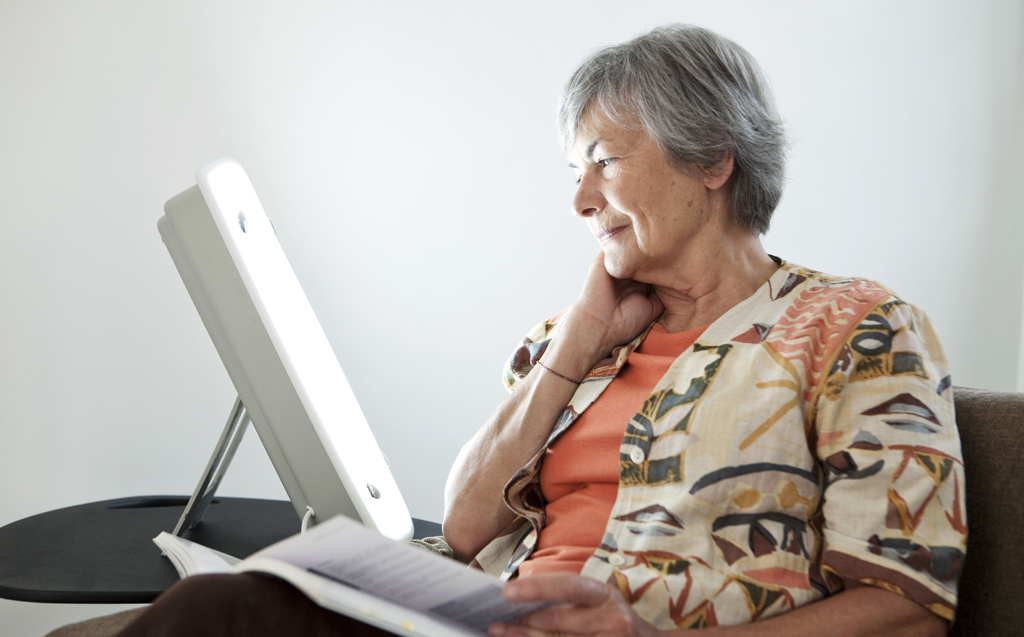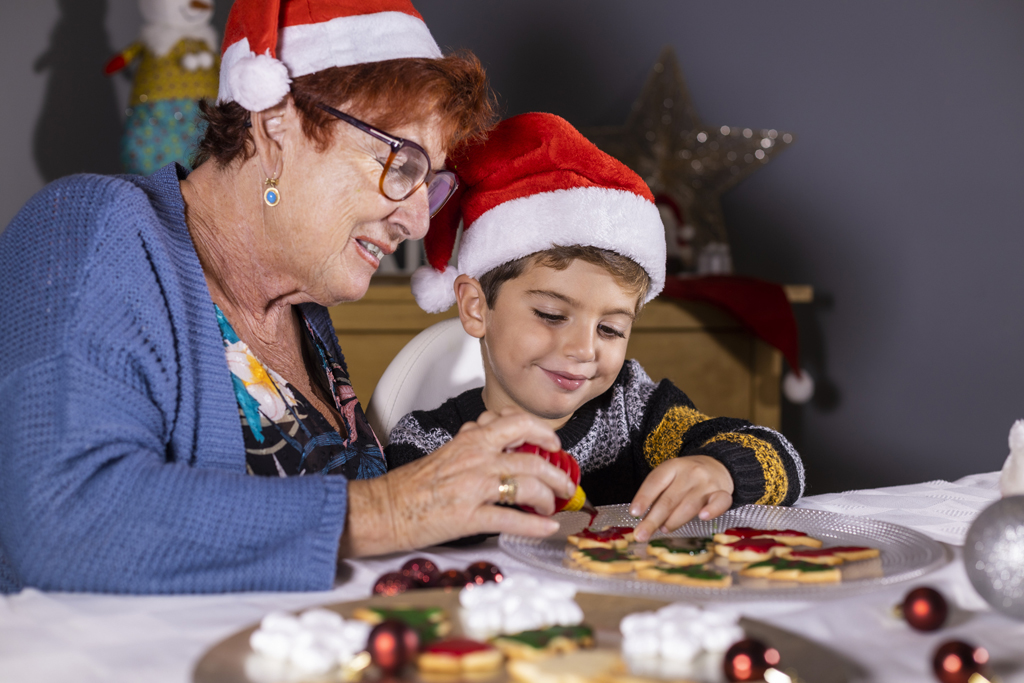Senior Holiday ‘Blues’: When All is Not Merry & Bright
During the holidays people are supposed to be upbeat, right? After all we say, “Merry Christmas” and “Happy Holidays” and all is festive and bright. But that’s not the case for everyone. For some people, the holidays can be a time of stress, anxiety, sadness and loneliness – or the “holiday blues.”
That can be especially true with seniors. During the holiday, you may notice a mood change in your senior loved one. They may seem uninterested in the festivities, appear sad or tired. It may not be the holidays that are the cause, but rather, memories of happier times and things that were lost through the years. Or they may be suffering from Seasonal Affective Disorder (SAD).
Seasonal Affective Disorder

One thing that can cause depression during the holidays is Seasonal Affective Disorder. SAD is a major depressive disorder that recurs during a specific time of year. For many people, young and old, it occurs in the fall and winter when there’s less sunlight.
According to the American Psychiatric Association, SAD symptoms can be range from mild to severe and can include some or all of the following symptoms, similar to major depression:
- Feeling of sadness or depressed mood
- Marked loss of interest or pleasure in activities once enjoyed
- Changes in appetite; usually eating more, craving carbohydrates
- Change in sleep; usually sleeping too much
- Loss of energy or increased fatigue despite increased sleep hours
- Increase in restless activity (e.g., handwringing or pacing) or slowed movements and speech
- Feeling worthless or guilty
- Trouble concentrating or making decisions
- Thoughts of death or suicide or attempts at suicide.
Symptoms of SAD are treatable. Treatment includes light therapy, anti-depressants and/or talk therapy. People affected with SAD in the winter months usually see improvement in spring.
Seniors and the Holiday Blues

For others, especially seniors, the holidays can trigger depressed feelings. Often the festivities of the season can bring up memories of loved ones who have died, making grief over their absence more acute. A senior may feel guilty about enjoying the season without their loved one.
In addition, family members may live far away, and a lack of mobility may prevent travel, even locally. The lack of interaction with others can increase a senior’s feelings of loneliness and potentially lead to isolation.
Symptoms of the holiday blues include most of the symptoms of SAD, plus:
- Expressions of helplessness
- Anxiety
- Loss of appetite
- Weight loss
- Lack of attention to personal care and hygiene
- Irresponsible behavior.
How to Help
The depression may pass after the holidays are over. But there are a few things families, friends and caregivers can do to help in the meantime.
- Reach out and include your senior loved ones in family events when possible.
- Get together and bake holiday cookies.
- Help them with their holiday shopping. Or invite them to accompany you on yours. It’s always nice to have a companion.
- Try making seasonal crafts. You can find plenty of fun and easy ideas online.
- Decorate their house. Get the kids involved and make decorating an event with hot cocoa and cookies. Indoor Christmas lights can be festive and may aid in relief of Seasonal Affective Disorder.
- Help them wrap their gifts or include them in wrapping yours.
- Call their friends and make a date for a visit.
- Simply ask how they are feeling. Let them know that they are in your thoughts.
- Take them outside. Fresh air is great for the mood and the sun helps with Vitamin D production.
- One of the best things to do with seniors is simply spend time with them. Whether you talk, watch a movie, or read a book, providing company helps prevent loneliness and isolation.
Other Types of Depression

If the symptoms extend beyond the holidays, they may evolve into major depression or persistent depressive disorder.
Everyone feels sad at times and may experience grief or sadness. But that usually passes and isn’t considered depression. According to the American Psychiatric Association, depression “causes feelings of sadness and/or a loss of interest in activities once enjoyed. It can lead to a variety of emotional and physical problems and can decrease a person’s ability to function at work and at home” and lasts at least two weeks.
There are several types of depression, including:
Major Depression is defined by the National Institutes of Health as “Severe symptoms that interfere with the ability to work, sleep, study, eat, and enjoy life. An episode can occur only once in a person’s lifetime, but more often, a person has several episodes.”
Persistent Depressive Disorder, which is defined by the NIH as “a depressed mood that lasts for at least 2 years. A person diagnosed with persistent depressive disorder may have episodes of major depression along with periods of less severe symptoms, but symptoms must last for 2 years to be considered persistent depressive disorder.”
Not a Normal Part of Aging
Depression is not a normal part of aging. In fact, most seniors aren’t depressed. According to the CDC, about 1% to 5% of those living in the community have depression. That number rises to 13.5% in those who require home healthcare and to 11.5% in older hospital patients.
Symptoms of depression are the same as those for SAD and the holiday blues, but last longer and may be more severe.
Depression in seniors can be caused by genes, brain chemistry and stress. Vascular issues may be to blame, as can other diseases, such as diabetes and Parkinson’s disease. Certain medications or combined medications can cause depression.
Treatment of Depression
If you are depressed or suspect a loved one is suffering from depression, the first step is to see your primary care doctor, who can test for underlying physical causes and assess medication effects. Your doctor may refer you to a specialist, such as a psychologist or a psychiatrist.
Major depression can be treated with psychotherapy, cognitive behavior therapy, medication, or a combination of them. It’s important to know that depression is a medical disorder and not a sign of weakness. There is treatment available.
* * *
The experienced and compassionate staff at The Maine Move helps seniors and their families evaluate what the best living situation is for their unique circumstances. We offer a complimentary consultation where we can talk about your or your loved one’s health and safety needs, moving plans, and what services we can provide to make the transition easier.
Halloween can be fun for kids and adults alike, but for some seniors – especially those who live alone – it can be a frightening time. Masked strangers and constant knocking can contribute to uneasiness during the holiday. Constantly getting up and down to answer the door can increase the risk of a fall.
There’s also the fear of unexpected pranks and possible vandalism: Insurance claims show that Halloween is one of the worst days of the year for homeowners and auto claims related to theft and vandalism.
But that doesn’t mean older adults should get spooked by Halloween. After all, why should they miss out on the fun? By following a few Halloween safety tips for seniors, it can be a joyous and rewarding evening no matter what your age.
Halloween Safety Tips for Seniors
- Go outside to give out candy, if possible.
Never let trick-or-treaters into your house or let anyone in to use the phone or bathroom. If weather permits, hand out candy from the porch. If you can’t go outside to hand out candy, use the peephole to see who’s at the door before opening it. - Keep pathways well lit.
That way you can see who’s there and you can be seen. Pathways also may have uneven pavement or bricks or may be slippery from rain. Reduce your fall risk by staying close to your home in a well-lit and open area. - Don’t let decorations impede the view.
Make sure they don’t block the light or views of main entrances, such as the front door, and make sure they aren’t in the way of trip trick-or-treaters. - Don’t use lighted candles as a decoration.
Lighted candles can be a hazard to you and to trick-or-treaters, whose costumes could catch fire. Use battery-operated candles instead. - Clear floors and hallways.
Make sure there aren’t obstacles on your path to the door. That includes stray cords, shoes, books, or other things that could trip you and cause you to fall. - Remember: You’re never too old to dress up!
If you dress up, be sure the mask (if you wear one) provides a clear view. Your costume should allow easy movement and shouldn’t be a falling or tripping hazard. - Invite a friend or family member over to help.
If you feel uncomfortable giving out candy by yourself, having someone with you may make it less stressful and more fun!
Safety Tips for Seniors with Dementia

Seniors with dementia or Alzheimer’s disease, who may already be anxious, may find Halloween especially upsetting. Halloween can be confusing and can trigger behavioral problems because of environmental changes, strange people in and around the house, masked visitors, misperceived threats and fear of the unknown.
Also, Halloween occurs around sundown, which can be a particularly difficult time of the day for people with dementia. Sundowner’s Syndrome is a state of confusion occurring in the late afternoon and spanning into the night that occurs in people with dementia and Alzheimer’s disease.
Never leave a person with dementia at home alone on Halloween. Have someone stay with them or take them to another setting such as an event at a senior center or a family member’s home for a few hours.
Tips for Seniors Who Don’t Want to Give Out Candy
If a senior has dementia, is physically unable, or doesn’t want to hand out candy themselves, there are a couple of things they can do:
- Put candy in a bowl on the porch with a sign that says, “One candy per person, please.”
- Ask a neighbor to give out candy for you and put a sign on the door that says, “Candy for this house being given out next door.”
There’s some debate over whether to leave a light on outside if you aren’t giving out candy at all. On one hand, leaving the light off is a sign that no candy is being given out. But it’s also a sign there’s no one home, increasing the risk of vandalism or burglary. It may be better just to leave the porch and inside lights on and put a sign on the door that says, “Sorry, no candy at this house.”
* * *
According to the AARP nearly 90% of older adults want to age in place and maintain their independence. An important factor in aging in place is a safe home with minimal risks. The Maine Move can perform a safety assessment to identify risk factors and help get necessary modifications made. Up to 50% of home accidents among seniors can be prevented by proper home modifications and repairs!
Call us for a complimentary consultation to assess your needs 207-313-3797.